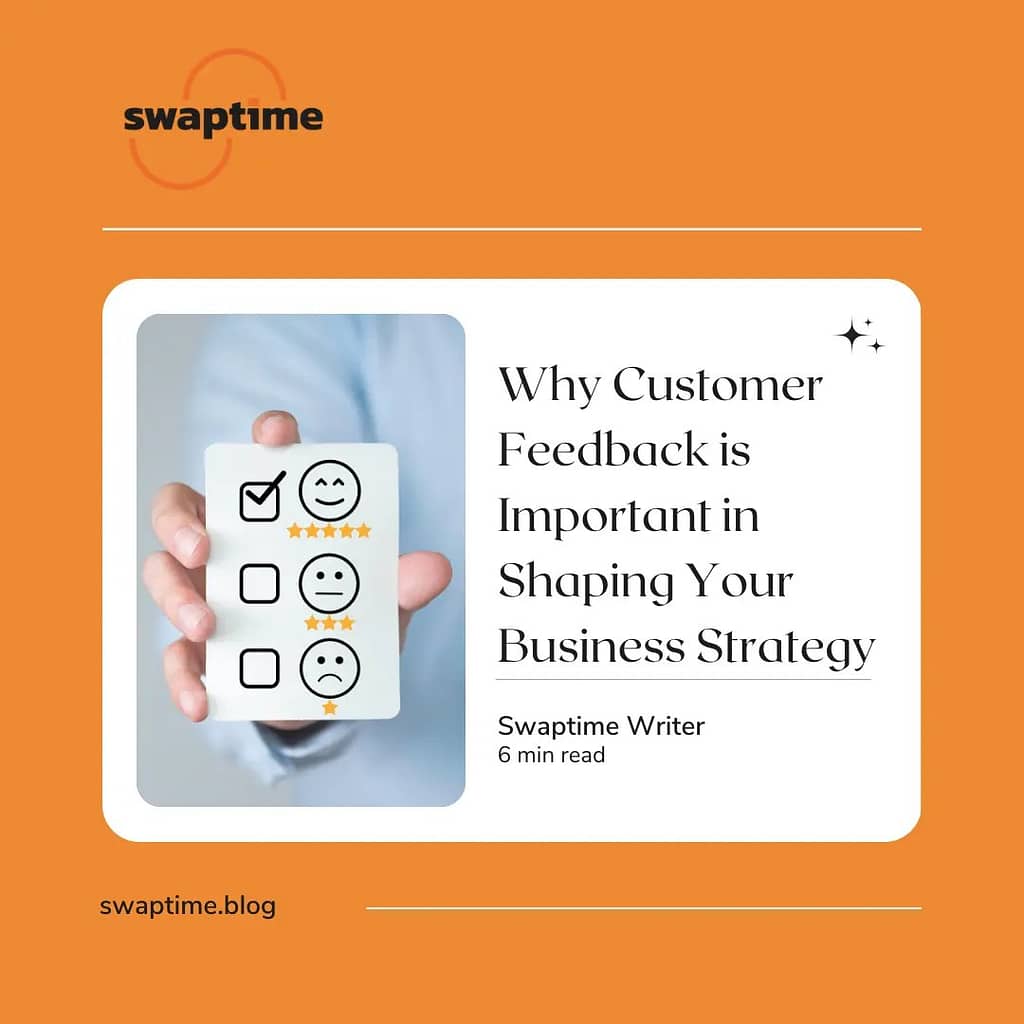The business world is competitive and understanding what your customers need and prefer through customer feedback is important to building your business strategy. All businesses need customer feedback. Whether you’re a startup, a small business, or an established enterprise, listening to your customers can provide invaluable insights to help you fine-tune your offerings and craft a strategy that resonates with your target market.
In this article, we explore why customer feedback is important for shaping your business strategy and driving its growth.
What is customer feedback?
Customer feedback refers to the information, opinions, and insights provided by customers about their experiences with a company’s products, services, or overall brand. It can include praise, complaints, suggestions for improvement, and insights into what works well or needs adjustment. Customer feedback is essential because it allows businesses to understand customer satisfaction, identify pain points, and gather ideas for product or service improvements. It helps shape business decisions and strategies to better meet the needs and expectations of customers.
Ways of collecting customer feedback
- Surveys
- Feedback forms
- Customer interviews
- Social media listening
- Online reviews
- Net Promoter Score (NPS)
- Customer support interactions
- Usability testing
- Live chat and chatbots
- Website analytics
- Emails and direct messaging
- Suggestion boxes
- Community forums
- Exit surveys
Why is customer feedback important in shaping your business strategy?
Direct insight into your market
At its core, customer feedback is direct communication from your customers about their experiences with your products or services. It can reveal what’s working, what’s not, and what needs improvement. This direct insight is important because no one knows your product better than those who use it.
Rather than relying solely on assumptions or internal data, feedback from customers allows you to see your offerings through the eyes of the end-user. This information can be used to adjust your business strategy to align with market expectations and needs.
Enhances customer satisfaction
Satisfied customers are the backbone of any successful business. By collecting and analyzing feedback, you can identify areas where your customers are happy and, more importantly, areas where they aren’t. Addressing these concerns shows customers that their opinions are valued, which can increase their loyalty to your brand.
For instance, if multiple customers point out that your customer service is slow or unresponsive, you can take actionable steps to improve it. These improvements lead to better customer satisfaction, which directly influences customer retention and positive word-of-mouth marketing.
Fuels product development
Customer feedback plays a significant role in product development. The feedback loop helps you understand how your products or services are being used, which features are appreciated, and what improvements customers want to see. When businesses pay attention to this feedback, they can innovate in ways that meet the evolving needs of their customers.
For example, many software companies release beta versions of their products and gather feedback from users to make necessary adjustments before the final launch. This helps ensure the product meets user expectations while reducing the likelihood of post-launch issues.
Builds stronger customer relationships
When customers feel that their voices are heard and that their feedback is used to make real changes, it strengthens the relationship between them and your brand. It promotes a sense of collaboration where customers feel they have a role in shaping the products and services they use. This can boost customer loyalty and encourage repeat business.
Moreover, responding to feedback, even negative feedback, in a professional and timely manner can turn unhappy customers into advocates. When customers see that you are committed to solving their problems, they are more likely to continue supporting your business.
Improves customer experience
The customer experience encompasses every interaction a customer has with your business, from browsing your website to post-purchase support. Feedback can pinpoint bottlenecks and friction points that customers face throughout their journey.
By using feedback to optimize the customer experience, you can improve not just satisfaction but also conversion rates. For example, if feedback indicates that your website is difficult to navigate, you can make the necessary changes to improve usability, potentially increasing sales.
Promotes data-driven decision-making
In the age of big data, making decisions without concrete evidence can be risky. Customer feedback provides valuable data that can guide decision-making processes. Instead of guessing which new product features will resonate with your audience, you can use real customer input to make informed decisions.
Customer feedback can also help you prioritize which areas of the business need the most attention. For example, if you’re torn between investing in marketing or product development, feedback can show you where the immediate need lies, allowing for more a strategic allocation of limited resources.
Identifies market trends
Trends in customer feedback can reveal shifts in the broader market. By monitoring and analyzing this feedback over time, you can spot emerging trends that may influence your industry. Staying ahead of these trends allows your business to adapt proactively, positioning you as a leader in your field.
For example, as sustainability became an important factor for consumers, many companies adjusted their business strategies to reflect eco-friendly practices. Those who listened to their customers’ growing desire for sustainable products gained a competitive edge.
Increases customer retention
Customer retention is cheaper than acquisition, and feedback plays a pivotal role in keeping customers coming back. When customers see that their feedback is driving change, they feel valued and are more likely to remain loyal.
Continuous feedback loops ensure that your business is constantly improving and adapting to meet customer needs. This adaptability enhances the customer experience and keeps customers engaged with your brand, reducing churn rates.
Competitive advantage
Businesses that actively seek and act on customer feedback are more likely to outperform their competitors. It is a saturated market and customers will gravitate toward businesses that demonstrate a commitment to improvement and customer satisfaction. By integrating feedback into your strategy, you show customers that your business is dedicated to meeting their needs, which can give you an edge over competitors who fail to listen.
Moreover, feedback can also reveal what your competitors are doing right or wrong. If customers are praising a feature that your competitor offers, you may want to consider incorporating something similar. Conversely, if they are complaining about a service your competitor offers, you can use this as an opportunity to differentiate your brand.
Shapes your marketing strategy
Customer feedback can also inform your marketing strategy by giving you a better understanding of what resonates with your audience. It can be the tone of your messaging, the platforms you use, or the campaigns you run. Feedback can guide you in creating more targeted and effective marketing efforts.
For instance, if customers frequently mention that they find your advertisements confusing, this can prompt you to simplify your messaging. Similarly, if they express appreciation for specific product features, you can highlight those in your marketing materials.
Conclusion
Incorporating customer feedback into your business strategy is more than just a best practice—it’s important for growth and sustainability. The importance of customer feedback lies in its ability to provide real-time insights, enhance customer satisfaction, and guide data-driven decisions. It serves as a foundation for improving products, innovating, and maintaining a competitive edge in the market.
By listening to your customers, you not only improve their experience but also build a business that is more agile, customer-centric, and poised for long-term success. Make customer feedback a key part of your business strategy, and watch your business thrive in response to the needs and desires of the very people it serves.
ALSO READ:



